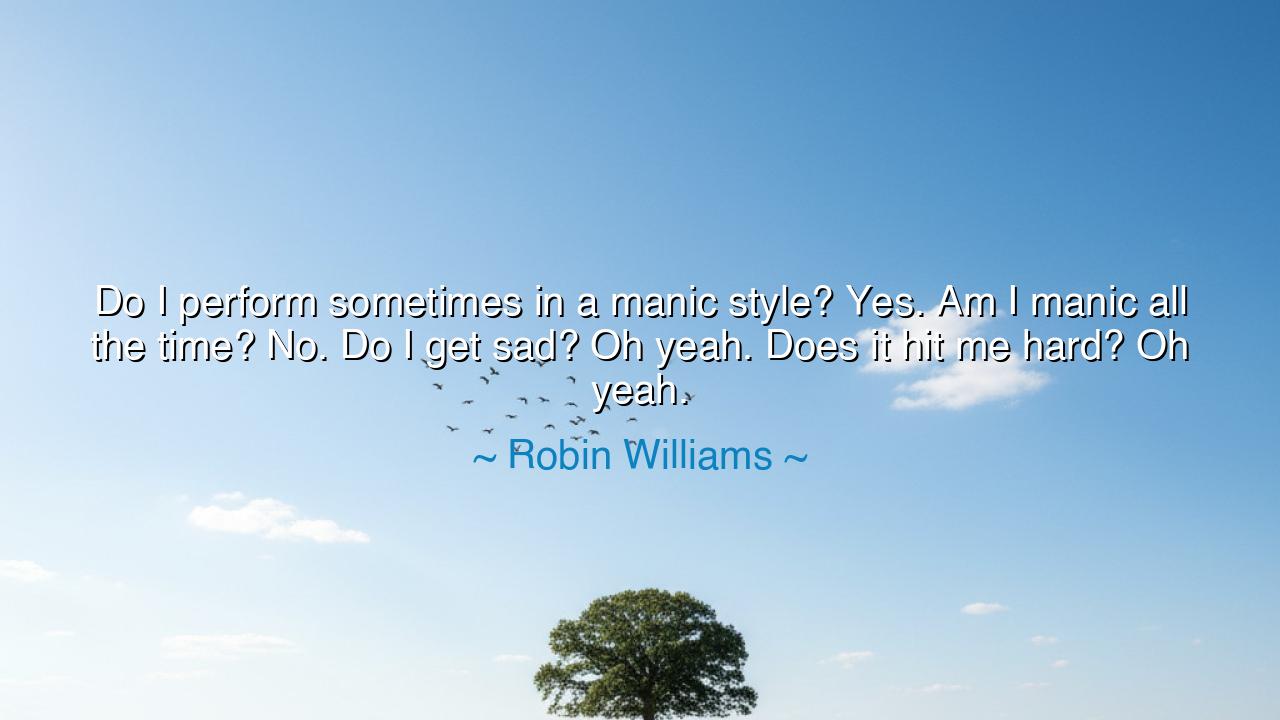
Do I perform sometimes in a manic style? Yes. Am I manic all the
Do I perform sometimes in a manic style? Yes. Am I manic all the time? No. Do I get sad? Oh yeah. Does it hit me hard? Oh yeah.






The words of Robin Williams, “Do I perform sometimes in a manic style? Yes. Am I manic all the time? No. Do I get sad? Oh yeah. Does it hit me hard? Oh yeah,” carry the weight of a man who danced with both light and shadow. Behind their rhythm lies a confession — honest, unguarded, deeply human. In these words, Williams reveals the eternal paradox of the soul: that joy and sorrow are not enemies but twins, bound together in the heart of every artist, every thinker, every person who feels the world too deeply. His statement is both an admission and a teaching — that beneath the laughter that lights up others often lies the ache of one who understands pain all too well.
In the ancient understanding of the human spirit, there was no division between brilliance and suffering. The Greeks believed in divine madness — “mania” — as the source of poetic vision. They said the muses touched the minds of artists and prophets, setting their souls ablaze with inspiration that bordered on torment. To live close to the divine fire was to risk being burned by it. So it was with Robin Williams. His manic energy on stage — that quicksilver wit, that wild improvisation — was not a mask but a manifestation of something sacred: the life-force of a man who refused to let sorrow silence him. Yet when the curtain fell, the fire dimmed, and what remained was the emptiness that often follows ecstasy.
There is an ancient story of Democritus and Heraclitus, two philosophers known as the “laughing” and the “weeping” sages. One found the absurdity of the world hilarious; the other found it heartbreaking. But both looked upon the same humanity. Robin Williams, in his way, was both at once — laughing and weeping for the same reason: because he loved life too much to be indifferent to its pain. His manic humor was not escapism but alchemy — the sacred art of transforming sorrow into laughter, turning darkness into something others could bear. Few have carried such a burden with such grace.
In his own words, Williams admits that sadness “hits hard.” This is not weakness, but the echo of a heart that feels beyond measure. Those who bring joy to others often pay a hidden price. The ancient poets knew this well. Aristotle once observed that all men of genius are melancholic, and history proves him right. From Beethoven to Van Gogh, from Hemingway to Sylvia Plath — the same souls who illuminated the world were often consumed by the fire within them. Their sadness did not mean failure; it meant they had ventured too close to the truth. The human condition is vast, and those who see it whole cannot help but weep as well as laugh.
Yet within Williams’s words there is also acceptance — a rare and noble honesty. He does not deny his sadness, nor does he let it define him. He acknowledges both sides of his being — the manic and the melancholic — and in doing so, he teaches what the ancients called equanimity: the courage to embrace all of oneself. To be human is not to seek constant joy, but to hold both joy and sorrow in balance, knowing that each gives meaning to the other. As the Taoist masters said, “The light is born of darkness, and darkness keeps the light alive.”
This duality — this dance of extremes — is what made Robin Williams beloved. He gave voice to both the ecstatic and the broken, showing that even in laughter, there can be understanding, and even in sadness, there can be love. When he played characters like the Genie, Mrs. Doubtfire, or John Keating in Dead Poets Society, he was not simply acting — he was teaching humanity to live more fully, to seize the day, to laugh even through the ache. His performances were acts of compassion, each one whispering: “You are not alone in your pain.”
The lesson, then, is this: feel deeply, and let your feelings be your teacher. Do not fear your sadness, nor shame your joy. The world teaches us to choose one over the other, but the wise know they are both sacred. When you are joyful, share your light; when you are sorrowful, seek meaning in your shadow. Do not strive to silence your emotions — learn to listen to them. For in understanding them, you understand yourself. As Robin Williams showed through his art and his honesty, the most human thing we can do is to embrace the fullness of our hearts — to laugh, to cry, and to keep loving, even when it hurts.






AAdministratorAdministrator
Welcome, honored guests. Please leave a comment, we will respond soon